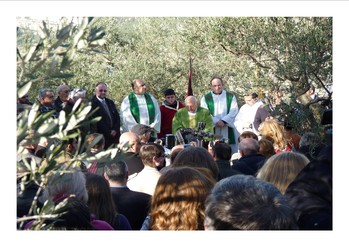After losing a long legal battle on the route of Israel’s Separation Barrier, the monks and nuns of the Cremisan Valley near Bethlehem will lose access to the school they run together.
On April 24 the Special Appeals Committee of the Tel Aviv Magistrate’s Court approved the appropriation of land in the Cremisan Valley, located between Bethlehem and Jerusalem, for the construction of the barrier separating Israel from the West Bank. The route of the barrier will pass through land which includes a convent of Salesian sisters, a Salesian monastery and farmland belonging to 58 Palestinian families, all of which would be annexed to Israel.
It will separate the Salesian monastery ― which will be on the Israeli side of the separation barrier ― from the convent and from the school it operates with the Salesian sisters.
The situation in the Cremisan Valley has been closely monitored by the Presbyterian Church (U.S.A.)’s Office of Public Witness (OPW) and Israel Palestine Mission Network (IPMN), through their participation in the Palestine Israel Ecumenical Forum of the World Council of Churches.
The Forum lifts up the “facts on the ground” in Palestine, and its February 2013 gathering ― at which Catherine Gordon of the OPW represented the PC(USA) ―was held in Beit Jala, part of the larger Palestinian valley of which Cremisan is a part.
The first petition against the seizure of the land, which includes 75 percent of the convent’s property, came seven years ago. It was among many petitions which have challenged the route of the barrier, most of which have been rejected by the Israeli High Court of Justice as well as the Special Appeals Committee, which reviews petitions against Israeli seizure of land under Israel’s 1949 Emergency Land Requisition Law.
The nuns run a school for underprivileged Palestinian children in the valley. Residents of the area note that the valley is also a popular area for recreation and the most important green space in the region which has already absorbed large Israeli settlement blocks.
The land confiscation also includes The Cremisan Cellars, which provide sacramental wine for the Christians of the region and have been in operation since the establishment of the monastery in the 19th century.
A response from the Israeli Defense Ministry stated that in order for the convent and monastery to continue to provide services for the Palestinian community, a special gate will be constructed.
However, Anica Heinlein, an advocacy officer representing the faith communities, stated that the gate would not be sufficient, noting “The monks don’t want to be on the Israeli side. They want to be with the community.” The annexation would also curtail plans to expand the school and its services.
As Heinlein explained, “The road leading to the school will have a heavy military presence. They are concerned that children will drop out.”
Israel’s inclusion of a gate in the barrier will mean the monks and many of the children attending the school will have to pass through an Israeli-controlled checkpoint at least twice a day to get to and from home and school everyday. Israeli checkpoints have not been reliable in the past. Many of them all over the West Bank cannot be counted on to be open and the days and hours they are open depend on Israel.
Non-violent protests against the annexation, in the form of outdoor worship, have been ongoing since December 2011. The legal team joined with community members and supporters on the Friday after the April verdict to hold a moment of silence, followed by the observation of a Catholic Mass. Behind those gathered was a handmade banner reading “We live and exist here.”
The Assembly of Catholic Ordinaries of the Holy Land protested the decision as well, noting in their statement that “the expropriation of lands does not serve the cause of peace and does not strengthen the position of moderates.”
“Our commitment in the Palestine Israel Ecumenical Forum is to support Christians in their trials with occupation across the various communions.The Cremisan case is one of those issues,” Katherine Cunningham of the IPMN told the Presbyterian News Service in a May 7 email. “Supporting them lifts up the challenges all Christians face there as the Separation Barrier cuts people off from their agricultural lands and their worshipping and faith-based educational communities.”
Another Presbyterian connection to the valley is the participation by IPMN and three northern California presbyteries ― San Jose, Redwoods and San Francisco ― in Keep Hope Alive, which plants olive trees on farms that are part of the valley, Cunningham said. “Our trips always include a visit to the Cremisan winery and to hear the monks and nuns tell of their ministry in the area, she said.
Robert Trawick is a Presbyterian Church (U.S.A.) ruling elder living in New City, NY. He is an associate professor of philosophy and religious studies at St. Thomas Aquinas College in Sparkill, NY.

